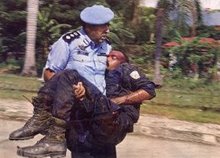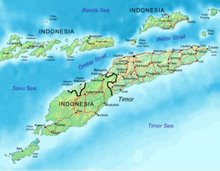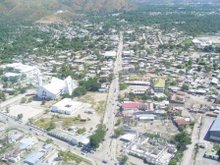- damaged Fretilin's already tarnished reputation
- The coalition holds 37 of the Parliament's 65 seats
- 'That's him, that's him, throw!' They were after me.
- Alkatiri announced he would encourage a campaign of civil disobedience
- Within minutes of Ramos-Horta's announcement
East Timor: Streets of Shame
Pedro Belo hasn't slept in two days. Commander of the Police District of Baucau, about 100km east of Dili, Belo is still wearing his body armor, yawning as sirens wail around his station. He sits at his desk reading reports of local outbreaks of violence that his men cannot respond to. "Every time we leave here they know, and they will attack this place," he says. "We've asked for help and we had the Australian soldiers come here, but they went around and then they left. They patrol in helicopters, but you can't catch anyone from a helicopter. You have to get out." Down the road from the barbed-wire-fenced police compound, the town's main thoroughfares are blackened with the remains of burnt tires and littered with broken glass and rocks the size of tennis balls. In the jail at the back of the station are more than 50 young men arrested for violent attacks or protests. "We have to let them out in 72 hours," says Belo. "I think there will be more trouble."
One might have thought the citizens of the tiny new nation of East Timor would be tired of violence. Hundreds were killed when Indonesia's departing military forces and pro-Jakarta militias implemented a scorched-earth policy in 1999; last year 37 people died and more than 150,000 fled their homes as tensions between the local police and military erupted. But last week it appeared some Timorese were still willing to make mischief to further their political ambitions. On Monday, President Jose Ramos-Horta announced the appointment as Prime Minister of former resistance fighter Xanana Gusmão, who leads a coalition made up of his own party, the National Congress for the Reconstruction of East Timor, the Timorese Social Democratic Association, the Social Democratic Party and the Democratic Party. The coalition holds 37 of the Parliament's 65 seats, giving it a substantial majority over the former governing party Fretilin, which won 21 seats in the June 30 elections. Fretilin's leaders, notably its general secretary, former prime minister Mari Alkatiri, argue that having won more seats than any other party Fretilin is entitled to run the country. Alkatiri has refused to cooperate with Gusmão's government and has declared it "illegal".
Within minutes of Ramos-Horta's announcement Fretilin activists, most of them from Timor's eastern provinces, poured into the streets from their refugee camps dotted around the capital, Dili. They set up barricades of tires, stones and bushes wherever roads bordered the camps, and from behind them launched rock attacks on passing cars. In the grounds of Dili hospital, Fretilin supporters living in tents pitched in the grassy courtyards between the wards emerged to taunt westerners living nearby. As the shouting turned into fighting, UN police, New Zealand soldiers and Portuguese Republican National Guard with riot gear and bullet-proof vests raced to the scene. They fired tear gas to disperse rock-throwing youths, who swiftly melted into the maze of alleys between the district's tiny shacks and stalls. Expat Australian Jim Clifford, owner of a pizza shop, was making deliveries on a motorbike. "I drove right through the middle of it. They were fighting at every intersection," he says. "The locals were angry. They've had enough. When the police came they were telling them to just shoot them [the easterners]." On the main road heading west out of the city, dozens of vehicles were bombarded with rocks. Christopher Samson, head of LABEH, an anti-corruption NGO, was driving home when his car was hit. "I saw them and heard them call out: 'That's him, that's him, throw!' They were after me. Bam! Bam! They got the driver's side window. It was terrifying."
UN spokeswoman Alison Cooper says the authorities are maintaining control in Dili. "The situation is volatile, but the incidents of violence are sporadic and isolated and able to be contained," she says, despite just having a rock smash through the windscreen of her UN car. The UN registered 31 incidents including arson, rock-throwing and roadblocks over a 10-hour period on Monday night, but had no reports of casualties. The worst attack torched the Customs office; a second Customs building was set on fire early Tuesday. On Wednesday Gusmão was sworn in and promised to "dedicate all my energy to the defense and consolidation of independence and national unity."
In the country's east, the new Prime Minister's talk of national unity fell on deaf ears. At Metanaro, hundreds of refugees erected huge Fretilin banners across the main highway, then blockaded it with rocks and logs. The road quickly became a no-go zone for the UN, with a policeman posted to stop UN vehicles from approaching after several were badly damaged by rocks. In Baucau seven buildings were torched and in Viqueque seven more were destroyed. At Quelecai, south-east of Baucau, fighting was continuing between pro-Fretilin youths and supporters of other political parties when TIME visited on Wednesday. Fretilin supporters blocked the road and refused access to the area to view the damage. One village leader said six people had been injured with darts and rocks.
As the violence began to ease in Dili, Alkatiri announced he would encourage a campaign of civil disobedience across the country. His statements — and his party's refusal to recognize the new government — have damaged Fretilin's already tarnished reputation. Former interior minister Rogerio Lobato is serving a seven-and-a-half-year jail term for arming a hit squad in the lead-up to last year's unrest. And just before the June election, the Fretilin-controled parliament voted to grant amnesties or reduce sentences for serious crimes relating to the violence of 2006, although the resolution was never signed into law by Ramos-Horta. Fretilin's political opponents accuse the party of fomenting violence to achieve their political ends, but Fretilin denies the claims, conceding only that it struggles to control some of its angry supporters. NGO head Samson is unconvinced. "They are worried about what the new government will do," he says. "They are worried that there will be an audit going back five years." It is a sad measure of East Timor's misery that a nation founded on so much promise should so soon be uneasy about its past.








5 comentários:
Que tal a Ministra da Justiça pedir ao jornalista da TIME que lhe dê a direcção do local onde está o Alfredo e fazer com que a lei se cumpra, detendo-o?
Within minutes of Ramos-Horta's announcement Fretilin activists, most of them from Timor's eastern provinces, poured into the streets from their refugee camps dotted around the capital, Dili. They set up barricades of tires, stones and bushes wherever roads bordered the camps, and from behind them launched rock attacks on passing cars. In the grounds of Dili hospital, Fretilin supporters living in tents pitched in the grassy courtyards between the wards emerged to taunt westerners living nearby. As the shouting turned into fighting, UN police, New Zealand soldiers and Portuguese Republican National Guard with riot gear and bullet-proof vests raced to the scene. They fired tear gas to disperse rock-throwing youths, who swiftly melted into the maze of alleys between the district's tiny shacks and stalls.
As the violence began to ease in Dili, Alkatiri announced he would encourage a campaign of civil disobedience across the country. His statements — and his party's refusal to recognize the new government — have damaged Fretilin's already tarnished reputation. Former interior minister Rogerio Lobato is serving a seven-and-a-half-year jail term for arming a hit squad in the lead-up to last year's unrest. And just before the June election, the Fretilin-controled parliament voted to grant amnesties or reduce sentences for serious crimes relating to the violence of 2006, although the resolution was never signed into law by Ramos-Horta.
Eu gostava a de ver o que é que aconteceria se fosse o CNRT a ganhar as eleições e o Horta desse o poder à Fretilin.
E melhor seria que os do CNRT, o Horta e o Xanana pensarem um pouco nisto antes de virem agora com o paleio dos tribunais. Se agora acham tão importante o recurso aos tribunais porque é que no ano passado não recorreram?
Ou querem fazer de nós anjinhos ao tentarem judicializar uma questão que é apenas da escolha política do Horta e que como tal é políticamente que se deve combater? Políticamente. Seja na rua, seja no Parlamento ou fora dele. E esta combate político tem estado a direcção e os deputados da Fretilin a travar e os seus seguidores na rua.
Porque contra uma decisão política responde-se politicamente.
Quem anda há anos pelo Mar de Timor a roubar-nos o petróleo já ganhou tanto dinheiro que lhe sobeja para comprar o Presidente da República, Primeiro-Ministro e Governo e até sobejou para fabricar um partido político que zele para que não atrapalhem mais roubos no Mar de Timor.
Fora com esta gente que nos está a roubar!
Fora com o CNRT Austrália!
Enviar um comentário